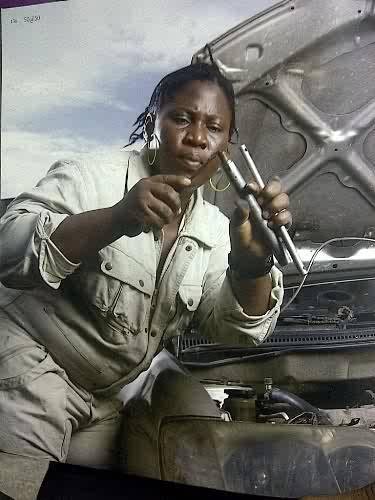From a young age, Sandra dreamed of becoming a mechanic to help fix things, inspired by stories her father told of the women he had seen repairing cars during his travels to the United States. When she told people of her aspirations, nobody took her seriously. They would even openly laugh at her saying it was taboo and it couldn’t be done. Even her own mother tried to discourage her by giving her extra chores to do after getting home from her job at a garage which she took so she could gain some useful experience. Additionally, showing up to work as a mechanic was not easy. Sandra recalls “ people tried to intimidate me, humiliate me; nobody wanted to be close to me. But that gave me enough room to focus on my chosen vocation.”

Sandra forged ahead despite insults and jibes, enrolling at the Auchi Polytechnic in 1989 to study mechanical engineering. After graduating from the program in 1991 as the first Nigerian woman to be certified as an auto-mechanical engineer, Sandra found jobs with the state-owned Bendel Transport Service and the Nigerian Railway Corporation. As soon as she could, Sandra opened her own garage in Lagos, established a solid customer base and began to bring other women into her profession.
In 2004, Sandra applied for the Ashoka Fellowship, with her idea to “promote positive change in the socioeconomic circumstances of the poor and vulnerable in Nigeria by demonstrating their ability to master a difficult skill, simultaneously securing their economic future and building their self-esteem.” Her idea? To train female mechanics. During the fellowship, Sandra established the “Lady Mechanic Initiative” which focuses on empowering vulnerable girls with mechanical and technical skills for a better life. Sandra reallas that the idea came to her after she had helped so many women fix their broken down cars; sometimes in places that were extremely dangerous. She states “ I realize I could do much more for women by teaching them to become mechanics”.
The Lady Mechanic Initiative includes a three-and-a-half-year course to women of backgrounds, including former sex workers and child laborers, to teach them the fundamental skills of idanosis and reapi, and how to build customer loyalty. She also emphasizes ethics, promoting quality workmanship and fair prices as her values. When trainees enter the Lady Mechanic Initiative, they receive overalls, a starter toolkit, and a small stipend. They also receive a comprehensive, fully illustrated diagnostic guide designed by Sandra herself. Sandra finds accommodations near the garage for the trainees whose homes are far away, and arranges factory internships to show her apprentices how cars are first put together. As graduates leave the program, Sandra arranges for small loans and technical support to help them start their own businesses.
Since 2014, Sandra estimates that over 700 girls have gone through the program. Now that her original training program has grown stable and strong, Sandra has begun introducing her methods to new populations across Nigeria. She appeals to the best mechanic workshops—currently male-run, of course—in each of the country’s 36 states, offering them small financial incentives to take in women. Garage owners have proven willing, even eager, to accept trainees through the Lady Mechanic initiative. Several already knew and respected the initiative by the time they were contacted. Sandra also plans to start franchise garages under the umbrella of the initiative and has recently secured a garage site in Abuja from the Nigerian government. As the network of participating garages grows, Sandra or a representative from her technical team will visit periodically to monitor progress and help each garage maintain the high standards of the original.
Sandra also helps even women who will never become mechanics to learn more about cars and auto safety. Basic mechanical skills and knowledge become vital along some lawless stretches of highway where breakdowns and flat tires can lead to robbery, harassment, or even rape. Sandra gives free lessons through radio and television, hosting a weekly call-in program along with the chief executive of Sandez car care. With invited experts, they offer practical information on topics such as road safety, police intervention, and highway codes. Sandra and her apprentices also offer car safety classes to several businesses, creating a revenue stream to help cover operating costs and support the initiative’s growth and expansion.
Sandra believes that women do not have to travel to Europe to be successful. Nor do they have to be limited by a history of prostitution, poverty, or lack of education. Furthermore, she strongly believes that any woman can empower herself. It is her aim in life to help them achieve a better future by giving them mechanical and technical skills they need to succeed. For those who think mechanics is still about physical strength, Sandra says that the technology available today makes it much easier for a woman to work unhindered by her own strength.
In 2017, Sandra’ stories was featured in the film series, “My Nigeria.” Produced by Al Jazeera English, the film won the Gold World Medal at the New York Film Festival later that year. That same year, Sandra was nominated by the Committee of Wives of Lagos State Officials (COWLSO) for the prestigious Inspirational Woman of The Year Award. The award seeks to recognize women who improve the social welfare of the people. Though she did not win, Sandra later was awarded the Inspirational Woman of the Year award and a National Merit Award in Nigeria.
I love Sandra’s outlook on life as she is quoted saying “…[success is about having inner peace, waking up every morning with a sense of joy about what you are contributing to the world and the people around you”.
